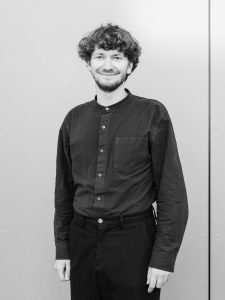Marcell Hajdu

Shortbio
- 2016 – 2018 Masterstudium Europäische Urbanistik, Bauhaus-Universität Weimar
- 2017 – 2018 Praktikum Urban Design, Gemeente Amsterdam
- 2011 – 2015 Bachelorstudium Verkehrsingenieurwesen, Technische und Wirtschaftswissenschaftliche Universität Budapest. Auslandssemester: Mobilität und Verkehr, Technische Universität Braunschweig
Contact
Bauhaus-Universität Weimar
Fakultät Architektur und Urbanistik
DFG-Graduiertenkolleg 2227 „Identität und Erbe“
D-99421 Weimar
Sitz: Prellerhaus | 3. OG | Raum 303
Geschwister-Scholl-Str. 6 | D-99423 Weimar
National Capital: The Politics of Urban Heritage in Budapest
The focus of my doctoral thesis is the role of urban heritage in the development of Budapest after 2010. By urban heritage, I do not only refer to built heritage as the object of heritage conservation. I use the term in a much looser sense to denote the complex processes of the city’s spatial transformation that are implicated in the reproduction of Hungarian national identity through collective remembering as articulated by the national government. This incorporates locating cultural, educational and political institutions, the organization of national celebrations and other popular events, the construction of monuments and memorials, and the design and naming of public spaces. In this context, the concept of national capital enables me to analyse these transformations as a central stage where hegemonic political struggles over the central signifier of the nation take place in contemporary Hungary.
While the current Hungarian government is a notorious example for the recent surge of right-wing populist political actors within the EU, the contemporary development of Budapest has received little academic attention. By exploring its recent developments, I hope to offer a valuable contribution to the academic discourse on the spatial politics of right-wing populism, as well as to the research training group’s (Identity and Heritage) endeavours in connecting the concept of heritage with collective identity formation. While the focus here is on the spatial reproduction of the right-wing populist hegemony, I believe that it can only be sufficiently analysed by taking into account its interrelations with the multiple democratic deficits of contemporary neo-liberal urbanization. Consequently, I approach populism from a non-essentialist perspective, building on post-foundational political theory to avoid a one-sided critique of Budapest’s development under the current national government.
Budapest as the centre of the country’s political administration and most of its national cultural institutions, home to almost one fifth of its population and responsible for a third of its economic output plays an outstanding role in the country’s hegemonic struggles. In order to answer the question “How is the hegemonic political order of contemporary Hungary (re)produced through urban heritage?” I structure my analysis into three parts. In the first one, I map the various developments initiated by the national government since 2010 that transform Budapest’s symbolic landscape and explore the architectural and urbanistic means by which the current political hegemony is reinforced. In the second analysis chapter, I turn to the historical narratives that structure the collective remembering of the state and look at the ways in which these are articulated through the previously mapped projects. Lastly, I investigate the role of these developments in the government’s increasing control over professional and cultural institutions, as well as local governance, and their contribution to the rise of a new national economic elite, closely connected to the country’s political elite.
My aim is to better understand how the current prevalence of urban heritage related development projects reproduce the right-wing populist, neo-liberal hegemony in the case of Hungary. While I expect the findings of my work will be specific to their context, I hope to develop a critical approach to urban heritage that contributes to the democratization of how we think about heritage and urban development in general.
Publications
- Liget Budapest: Spectacle, Architecture, and Right-Wing Populism. In: The Avery Review 39. (April 2019), https://averyreview.com/issues/39/liget-budapest